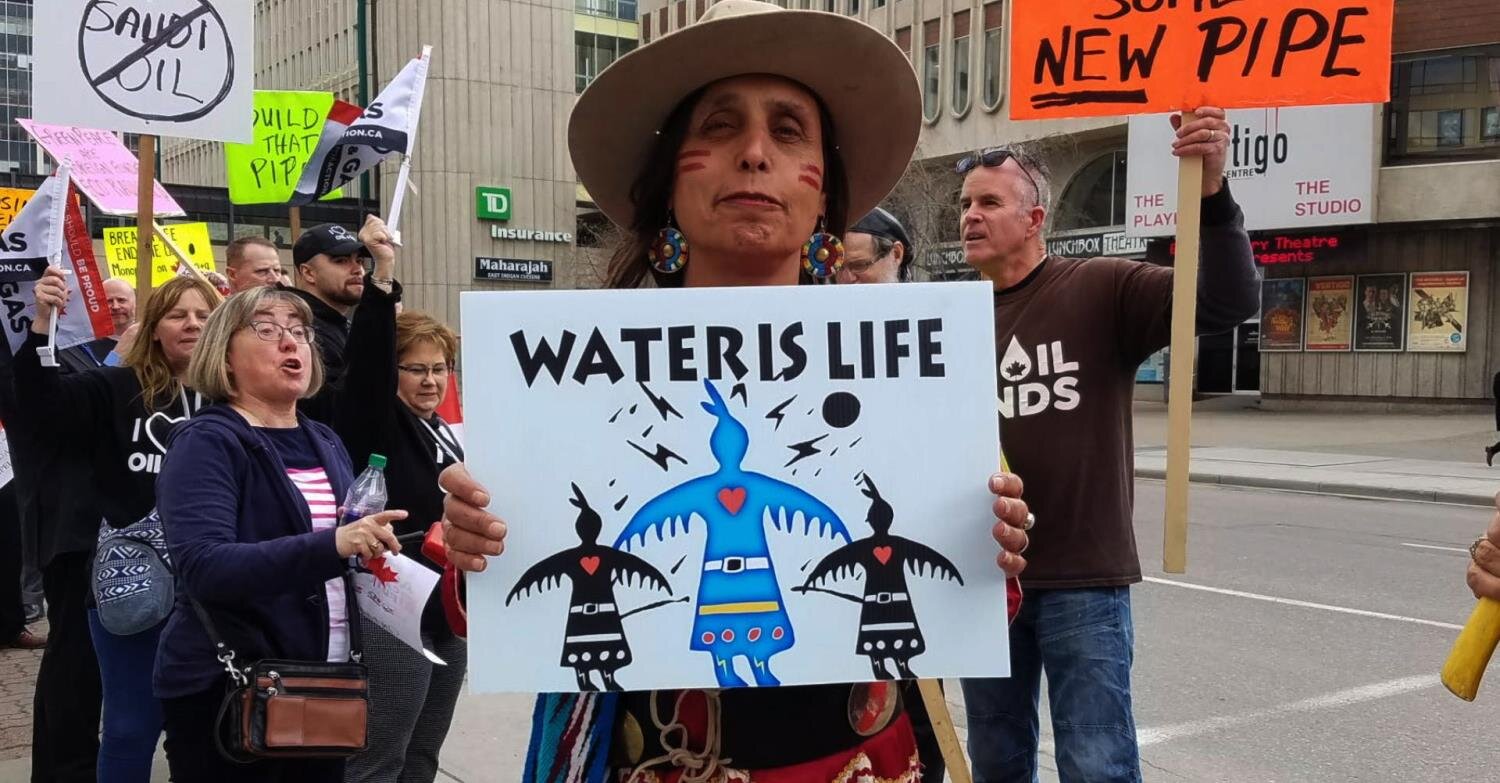
- Details
- By Darren Thompson
A county judge in central Minnesota dismissed two counts of trespassing against activist Winona LaDuke this week.
The charges are related to an incident on December 5, 2020, when LaDuke was charged with two counts of misdemeanor trespass for participating in a prayer lodge on the banks of the Mississippi River. On the day Line 3 construction was scheduled to begin, law enforcement posted “no trespassing” signs around a group of people conducting a ceremony and then demanded that everyone leave.
“I’m grateful for the dismissal,” LaDuke, founder and former executive director of Honor the Earth, said in an interview with Native News Online. “The charges were wrong. We are Anishinaabe and we are water protectors.”
LaDuke’s attorneys defended her right to participate in her religious freedom and alleged the American Indian Religious Freedom Act (AIRFA) in their court documents, “violations of the American Indian Religious Freedom Act, the First Amendment to the United States Constitution, and the Religious Freedom Restoration Act.”
“Judge Metzen’s prudent decision to dismiss these exaggerated charges against Ms. LaDuke once again illustrates that Winona’s rights to exercise her religious and First Amendment freedoms were not in any way criminal trespass,” Frank Bibeau, one of LaDuke’s attorneys, said in a statement.
The Minnesota Public Utilities Commission (PUC) made agreements with Enbridge to reimburse for extra policing during the construction of the Line 3 Oil Pipeline Replacement Project. In total, both the Minnesota DNR and Aitken County Sheriff’s Office received at least $8.6 million in reimbursement funding for Line 3 related activity. Nearly 900 people were arrested during the construction of Line 3, from December 2020 to October 2021.
“Aitkin County received over $350,000 from Enbridge to turn water protectors into criminals,” LaDuke said. “There are still many other water protectors who have been charged, all while Enbridge is gunning for the Straits of Mackinac risking the Great Lakes.”
While the courts dismissed the trespassing charges against LaDuke, a White Earth Ojibwe citizen, she is still a defendant in Aitkin and Wadena counties on separate charges related to her opposition of Enbridge’s Line 3 Oil Pipeline Replacement Project.
Enbridge Line 5 was built in 1953 and is a 30-inch oil pipeline that transports crude oil from western Canada to eastern Canada, 645 miles from Superior, Wisconsin to Sarnia, Ontario via the state of Michigan. The most controversial part of the pipeline is in the Straits of Mackinac, the narrow waterway that connects Lake Michigan and Lake Huron.
In 2018, an anchor from a freight ship struck and damaged the Line 5 pipeline while passing through the Straits of Mackinac. While damage from the passing didn’t lead to an oil spill, then-Republican Governor Rick Snyder made an agreement with Enbridge to protect the pipeline from future damage and keep it operational. Enbridge later built a $500 million tunnel under the lake to enclose the Line 5 pipeline.
Two years later, Michigan Governor Gretchen Whitmer, a Democrat, ordered Enbridge to cease operations in the Straits of Mackinac, effectively shutting the Line 5 oil pipeline down.Enbridge has refused to end operations, saying it earns an estimated $2 million daily and has been operating the pipeline safely and reliably for decades.
Enbridge wants to replace the pipeline inside a utility tunnel drilled beneath the Straits, arguing that would heighten protections against environmental damages. Enbridge already received permits to build the tunnel from Michigan state environmental regulators and the Mackinac Straits Corridor Authority. The U.S. Army Corps of Engineers has already begun its environmental impact statement (EIS), and is expected to take several years to complete.
More Stories Like This
Trump signs law that revokes some limits on drilling in Alaska’s National Petroleum ReserveSouthern Sierra Miwuk Nation Gets 900-Acres ofLand Back
Chilkat Indian Village Tells New Palmer Mine Owners They Are “Not Welcome” in Chilkat Valley
Tribes, Coastal Group Ask Army Corps to Revoke Permit for Texas Export Terminal
Michigan Tribes Tell Supreme Court: Don’t Bail Out Enbridge
Help us defend tribal sovereignty.
At Native News Online, our mission is rooted in telling the stories that strengthen sovereignty and uplift Indigenous voices — not just at year’s end, but every single day.
Because of your generosity last year, we were able to keep our reporters on the ground in tribal communities, at national gatherings and in the halls of Congress — covering the issues that matter most to Indian Country: sovereignty, culture, education, health and economic opportunity.
That support sustained us through a tough year in 2025. Now, as we look to the year ahead, we need your help right now to ensure warrior journalism remains strong — reporting that defends tribal sovereignty, amplifies Native truth, and holds power accountable.
 The stakes couldn't be higher. Your support keeps Native voices heard, Native stories told and Native sovereignty defended.
The stakes couldn't be higher. Your support keeps Native voices heard, Native stories told and Native sovereignty defended.
Stand with Warrior Journalism today.
Levi Rickert (Potawatomi), Editor & Publisher

